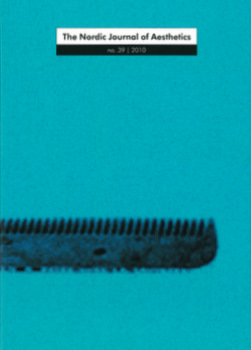Not Yet. The Philosophical Significance of Aesthetics
DOI:
https://doi.org/10.7146/nja.v21i39.3002Keywords:
The aesthetic, the poetic, Aristotle, Hegel, aesthetics within philosophyAbstract
The paper asks for the preconditions and the consequences of the emergence of aesthetics in and for philosophy. The question is: what does it mean for philosophy to engage the question of the aesthetic? My answer will be: it means nothing less than putting philosophy in question. Or, more precisely: by engaging the question of the aesthetic, philosophy puts itself in question. In order to show this, I will refer to a brief passage in the Phenomenology of the Spirit and then attempt to turn it against what I take it to be Hegel’s own intention. The paper attempts to sketch this argument in three brisk moves by (1) distinguishing a philosophy of the “poetic” from a philosophy of the “aesthetic”; (2) describing the aesthetic as “regressive” and “(self-)reflexive”; and (3) sketching the paradoxical place of aesthetics within philosophy.
Downloads
Published
How to Cite
Issue
Section
License
Authors who publish with this journal agree to the following terms:
- Authors retain copyright and grant the journal right of first publication with the work simultaneously licensed under a Creative Commons Attribution License that allows others to share the work with an acknowledgement of the work's authorship and initial publication in this journal.
- Authors are able to enter into separate, additional contractual arrangements for the non-exclusive distribution of the journal's published version of the work (e.g., post it to an institutional repository or publish it in a book), with an acknowledgement of its initial publication in this journal.
- Authors are permitted and encouraged to post their work online (e.g., in institutional repositories or on their website) prior to and during the submission process, as it can lead to productive exchanges, as well as earlier and greater citation of published work (See The Effect of Open Access).




